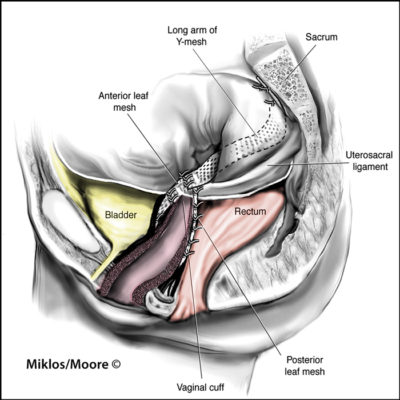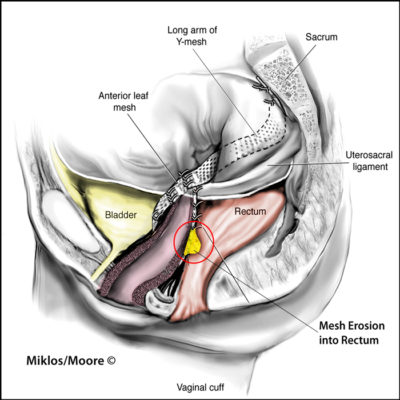LAPAROSCOPIC SACROCOLPOPEXY MESH REMOVAL – INFECTED GORTEX
Type I soft, polypropylene mesh almost never is the CAUSE of an infection, however if an infection occurs (ie there is a baseline risk of pelvic abscess or infection with hysterectomy of <1%) at time of hysterectomy or for another reason the mesh may need to be removed. If a sacralcolpopexy is completed at time of hysterectomy, the risk of infection is slightly higher secondary to the hysterectomy and is not due to the mesh (ie there is a risk of infection with any hysterectomy whether mesh is used or not). If a pelvic infection or abscess occurs, antibiotics may be used in attempt to cure it, however many infectious disease experts may recommend that the mesh needs to be removed for the infection to resolve as it is a foreign body that the bacteria may be adhered to. We have never seen a true rejection or allergic reaction to a Type I mesh, however if it did occur, the mesh would need to be removed. Again, most surgeons would have to do a major operation through a large abdominal incision, however Drs. Miklos and Moore remove the mesh through a laparoscopic outpatient type procedure.

NORMAL SACROCOLPOPEXY

ABSCESS OF MESH
LAPAROSCOPIC SACROCOLPOPEXY – RECTAL/BOWEL/COLON EROSION
Drs. Miklos and Moore have been invited to lecture and demonstrate their innovative and cutting edge surgical technique by performing live surgery in Capetown, South Africa at the International Urogynecology Association (IUGA) meeting in August 2016.

